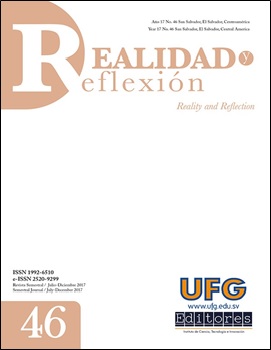View of the technological innovation in Central America and Latin America
DOI:
https://doi.org/10.5377/ryr.v0i46.5511Keywords:
Innovation, Technological innovation, Research and development activities R&DAbstract
This article aims to initiate and promote the dialogue on technological innovation as a development strategy in the Salvadoran economy, because there are few indicators of innovation in the country and the application of it as part of the activities of private companies and public organizations where is very laconic when compared to economies where innovation is part of the productive and cultural processes. The empirical evidence shows how some of economies with no natural resources have found a significant improvement when venturing into technological innovation, for which an infrastructure and an effective and dynamic human capital formation have been developed.
Currently, the world is progressing successfully in the development of technologies as means of improvement, however, Latin America has not been able to take off in technological development, even worse, most of the countries in Central America do not encourage basic research, applied research and the experimental development, so that the human capital when incorporating to the productive life does not produce a leap of quality or create the conditions of a competitive advantage that initiates or maintains the sustainable development of the economy. Even when there are recommendations from international organizations about the routes or strategies for developing countries, the entities in charge of the formation of human capital are not articulated to work under a common goal, that is why here are some recommendations that are outlined Enables the role of each of them so that technological innovation is strengthened and will happen in a near future in a development sector for the country.
Reality and Reflection Year 17, No 46, July-December 2017; 96-117
Downloads
1153
Downloads
Published
How to Cite
Issue
Section
License
© Universidad Francisco Gavidia
Instituto de Ciencia, Tecnología e Innovación (ICTI)
Reality and Reflection
The content and opinions expressed in the publication are the responsibility of the authors of the published articles. The authors assign the publishing and publishing rights, in printed and digital version, to the Universidad Francisco Gavidia.
Proof of originality and assignment of publication rights
The authors must sign a certificate in which they indicate that the text presented for publication is original, unpublished and that it has not been sent for review in another academic publication; In turn, the authors assign the rights of publication and publication to Francisco Gavidia University. The format of this record will be sent through the emails: editores@ufg.edu.sv and jlozano@ufg.edu.sv
The journal Reality and Reflection is housed in the institutional dissemination platforms (web page and in the repository), as well as in databases and other pages of scientific dissemination. The publications of the Francisco Gavidia University are subject to the Salvadoran copyright law, contemplated in the Intellectual Property Law https://www.asamblea.gob.sv/
The content of the work is the sole responsibility of the author, therefore, if for any reason or reason, direct or indirect, the Editor is obliged to pay any compensation to a third party derived from the work of the author, whether it is established in a transaction, agreement or final or enforceable judicial sentence, the Editor may repeat against the Author for the total amount of compensation, plus adjustments, interests and costs that correspond.
It will be the obligation of the UFG to grant five copies of the publication which will be delivered at the UFG Editores headquarters in San Salvador.

